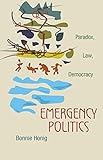Emergency Politics : Paradox, Law, Democracy / Bonnie Honig.
Material type: TextPublisher: Princeton, NJ : Princeton University Press, [2009]Copyright date: ©2009Edition: Course BookDescription: 1 online resource (224 p.)Content type:
TextPublisher: Princeton, NJ : Princeton University Press, [2009]Copyright date: ©2009Edition: Course BookDescription: 1 online resource (224 p.)Content type: - 9780691152592
- 9781400830961
- 352.235 22
- JF251.H66 2011
- online - DeGruyter
- Issued also in print.
| Item type | Current library | Call number | URL | Status | Notes | Barcode | |
|---|---|---|---|---|---|---|---|
 eBook
eBook
|
Biblioteca "Angelicum" Pont. Univ. S.Tommaso d'Aquino Nuvola online | online - DeGruyter (Browse shelf(Opens below)) | Online access | Not for loan (Accesso limitato) | Accesso per gli utenti autorizzati / Access for authorized users | (dgr)9781400830961 |
Browsing Biblioteca "Angelicum" Pont. Univ. S.Tommaso d'Aquino shelves, Shelving location: Nuvola online Close shelf browser (Hides shelf browser)

|

|

|

|

|

|

|
||
| online - DeGruyter On Myself, and Other, Less Important Subjects / | online - DeGruyter Questioning the Veil : Open Letters to Muslim Women / | online - DeGruyter Taming the Beloved Beast : How Medical Technology Costs Are Destroying Our Health Care System / | online - DeGruyter Emergency Politics : Paradox, Law, Democracy / | online - DeGruyter Religious Experience Reconsidered : A Building-Block Approach to the Study of Religion and Other Special Things / | online - DeGruyter Were the Jews a Mediterranean Society? : Reciprocity and Solidarity in Ancient Judaism / | online - DeGruyter Mitzvah Girls : Bringing Up the Next Generation of Hasidic Jews in Brooklyn / |
Frontmatter -- Contents -- Acknowledgments -- Preface -- Introduction. Surviving -- Chapter One. Beginnings -- Chapter Two. Emergence -- Chapter Three. Decision -- Chapter Four. Orientation -- Chapter Five. Proximity -- Aftermath -- Notes -- Bibliography -- Index
restricted access online access with authorization star
http://purl.org/coar/access_right/c_16ec
This book intervenes in contemporary debates about the threat posed to democratic life by political emergencies. Must emergency necessarily enhance and centralize top-down forms of sovereignty? Those who oppose executive branch enhancement often turn instead to law, insisting on the sovereignty of the rule of law or demanding that law rather than force be used to resolve conflicts with enemies. But are these the only options? Or are there more democratic ways to respond to invocations of emergency politics? Looking at how emergencies in the past and present have shaped the development of democracy, Bonnie Honig argues that democracies must resist emergency's pull to focus on life's necessities (food, security, and bare essentials) because these tend to privatize and isolate citizens rather than bring us together on behalf of hopeful futures. Emphasizing the connections between mere life and more life, emergence and emergency, Honig argues that emergencies call us to attend anew to a neglected paradox of democratic politics: that we need good citizens with aspirational ideals to make good politics while we need good politics to infuse citizens with idealism. Honig takes a broad approach to emergency, considering immigration politics, new rights claims, contemporary food politics and the infrastructure of consumption, and the limits of law during the Red Scare of the early twentieth century. Taking its bearings from Moses Mendelssohn, Franz Rosenzweig, and other Jewish thinkers, this is a major contribution to modern thought about the challenges and risks of democratic orientation and action in response to emergency.
Issued also in print.
Mode of access: Internet via World Wide Web.
In English.
Description based on online resource; title from PDF title page (publisher's Web site, viewed 30. Aug 2021)


